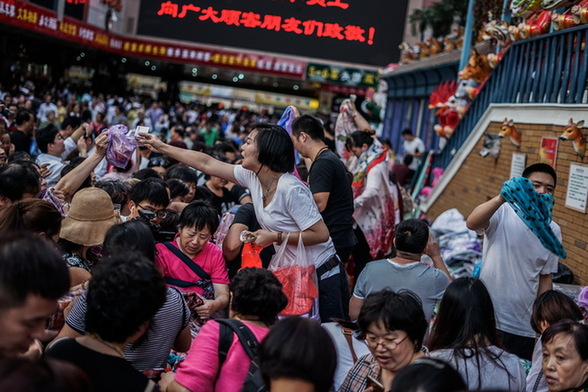Beijing’s landmark wholesale market closes for good
Tianyi Market, Beijing’s largest small commodities wholesale market, officially ended its 25-year life on Friday with thousands of shoppers enjoying their last chance of a cheap shopping spree.
|
Thousands of shoppers enjoy a last shopping spree at Beijing’s biggest wholesale market of Tianyi that closed for good on Sept. 15, 2017 after a 25-year operation. [Photo by Zheng Liang / China.org.cn] |
With one minute to go before closure, both shoppers and vendors stopped bargaining and took out their cameras or mobile phones to record the end of an era, with nostalgic farewell songs such as “Unforgettable Tonight” and “Auld Lang Syne” being played over the public address system.
“I have carried on business here for more than 10 years,” one vendor told China.org.cn, “I can’t just let it go in my heart.”
Tianyi Market opened on Nov. 18, 1992, and at its peak had more than 4,650 booths rented to 1,900 vendors selling over 130,000 kinds of commodities from all over the country. It was convenient for Beijing residents to buy all kinds of things for daily use and items for celebrating various festivals at cheap prices.
However, the Beijing government started a campaign to remove low-end businesses and wholesale markets, transferring them to neighboring cities, in order to reduce the population and relocate non-capital functions. It plans to remove all wholesale markets within the city’s Fourth Ring Road by 2020.
Tianyi Market has signed a contract cancellation agreement with the vendors and compensated them with four times the amount they initially paid in a guarantee deposit of 100,000 yuan (US$15,200).
However, for long-term vendors who likely paid one million yuan (US$152,000) in booth rent (guarantee deposit not included) for 10 years, for example, the compensation of 400,000 yuan (US$61,000) won’t necessarily help them much.
Liu Haitao, chairman of Tian Heng Group, which owns the real estate property containing Tianyi Market, said some vendors at first were not happy and didn’t understand the situation. However, his team negotiated with them and persuaded them to comply.
While some vendors have founded online platforms or returned to their hometowns to continue business, many others lost their living.
During the last days of Tianyi Market, tens of thousands of shoppers poured into the building for a last shopping spree, with security and customer flow controls tightened. Many goods were sold at very discounted prices.
After the market closed, the Tianyi building will be transformed into a venue to house technology companies and financial enterprises, Liu said. Tianyi Market may be reborn in Tianjin or neighboring Hebei Province, and many vendors have already pledged to follow it there and work with it again, a market representative said.
Previously, at the end of 2015, the branch of Tianyi Market at Di’anmen was closed after operating for 14 years.
Beijing has removed and improved 302 markets and 51 logistics centers in the period of 2015-2016. In 2017, the city plans to remove or renovate 120 markets and 38 logistics centers, according to an announcement by the Beijing Municipal Commission of Commerce. As of June, it had either removed or renovated 53 markets and three logistics centers.
